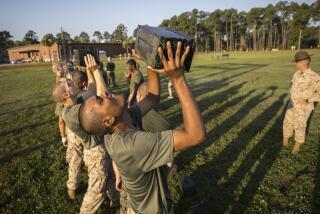Battle Won, Marines Need Basic Training -- in Arabic
CAMP PENDLETON — When U.S. Marines went into Iraq last year they were armed with plastic cards printed with important Arabic phrases needed in the fight to topple Saddam Hussein.
Now the Marines are returning to Iraq, but their mission will be more about nation-building than combat. That makes the need to communicate with Iraqis in their own language even more critical.
So, hundreds of Marines and Navy medics at Camp Pendleton, Twentynine Palms and Camp Lejeune, N.C., are undergoing an intensive monthlong course to learn basic Arabic and, perhaps more important, pick up a few lessons in cultural sensitivity.
“We realize the importance of treating the Iraqis with respect and trying to gain their respect and trust,” Maj. Kirk Greiner, assistant operations officer of the 1st Marine Division, said Friday. “Showing the Iraqis that we’re making an effort [to speak Arabic] is important.”
About 20,000 Marines from Camp Pendleton and 5,000 from Camp Lejeune will depart in coming weeks to relieve the Army’s 82nd Airborne Division in a sprawling area west of Baghdad.
“The mission is very different this time,” said one student, Lance Cpl. Ashot Malkhassian, a machine-gunner whose unit saw action in southern Iraq. “Last time we were taking down a dictator. Now, we’re trying to help the people get their lives back.”
Taught by instructors from the Defense Language Institute and Berlitz International Inc., the course is meant to provide instruction in basic vocabulary, sentence structure and voice inflections.
Don’t mumble a greeting, the Marines were told. Be expansive and confident in tone but not overbearing. Don’t rush an Iraqi if he’s trying to tell you something. Listen when the Iraqis speak.
“They’re teaching us to respect the culture and not be so close-minded about things that are different,” said Cpl. Robert McNulty, a cook with an anthropology degree from the University of Missouri.
Many of the phrases (including “Qif wa-il-la sa-et-leg qw-naar,” roughly translated as “Stop or I will shoot you!” ) are those that will be needed when Marines are manning checkpoints or searching homes. But others are meant to be helpful in street-level conversation, such as “Salama-liki” (“Peace to you”) and “Nahnoo hoona limoo-saa-edu-tek” (“We are here to help you”).
The need for better language proficiency is one of the lessons learned from last year’s mission.
“We’re doing things the Marine way,” Greiner said. “This is something we identified on our own when we came back from Iraq last summer.”
The course includes all-day instruction and three hours of homework at night. For a final exam, each Marine and sailor will be required to navigate the Internet using Arabic words, provide an introductory speech (written and oral) and engage in a 10-minute role-playing conversation.
The Berlitz instructors have tailored their lessons to a Marine audience. Not many other Berlitz students need to know how to say, “Drop your weapon,” “Where is the mine field?” or “Give me your identification.”
“We will succeed,” instructor Rachid Qamch, a Moroccan, told his students. “We will break this language down. It’s only words. So who will win: us or the words?
The response was quick: “Us.”
Although it is the first time Berlitz is instructing Marines, the company has taught courses for Navy SEALs and other special operations troops.
Marines are told that when entering an Iraqi home they should show deference to the oldest male and avoid even eye contact with females, lest it be seen as a sign of disrespect. Accustomed to the mores of modern America, the Marines find the gender strictures unusual.
“You don’t look at them, shake hands with them, or even smile at them,” said Lance Cpl. Casey Roach, a mortar specialist. “We don’t want them to take any umbrage at us.” Roach, like many of the Marines, studied Spanish before enlisting. Although Arabic is challenging -- the alphabet is different and the script trails right to left -- he has something in the Arabic course that was missing in the Spanish class: motivation.
“I never figured when I was in Spanish class that I better learn because I’m going into a war zone in Mexico,” Roach said. “That’s what makes this different.”
More to Read
Sign up for Essential California
The most important California stories and recommendations in your inbox every morning.
You may occasionally receive promotional content from the Los Angeles Times.










